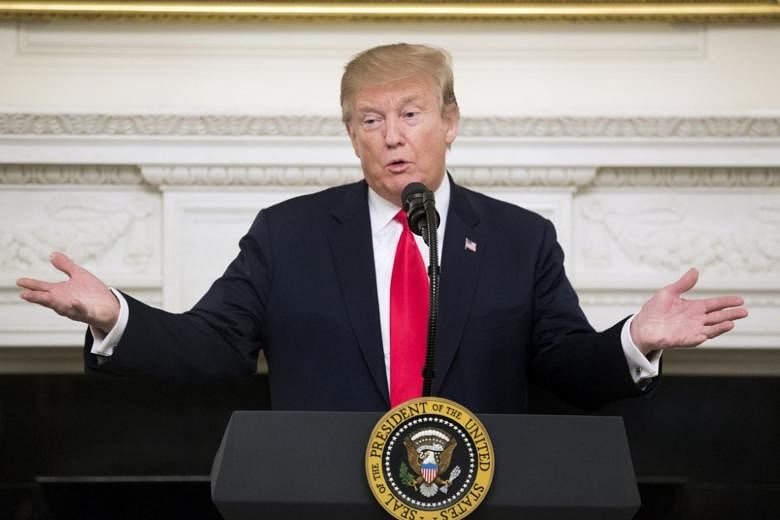WASHINGTON (REUTERS, AFP) - US President Donald Trump looked set to open a new front in his trade wars with a plan to end preferential trade treatment for India that allows duty-free entry for US$5.6 billion (S$7.6 billion) worth of the country's exports to the United States.
Washington also intends to scrap the preferential trade status granted to Turkey, the US trade chief's office said on Monday (March 4).
The move comes as the US and China seek to negotiate an exit from a costly trade war between the two countries that is part of the Trump administration's efforts to address what it views as inequitable commercial relationships with other states.
Washington "intends to terminate India's and Turkey's designations as beneficiary developing countries under the Generalised System of Preferences (GSP) programme because they no longer comply with the statutory eligibility criteria," the Office of the US Trade Representative said in a statement.
Trump, who has vowed to cut US trade deficits, has repeatedly called out India for its high tariffs, and US trade officials said scrapping the concessions would take at least 60 days after notifications to Congress and the Indian government. Trump began that process on Monday with letters to the speaker of the House of Representatives and the president of the Senate.
"I am taking this step because, after intensive engagement between the United States and the government of India, I have determined that India has not assured the United States that it will provide equitable and reasonable access to the markets of India," Trump said told congressional leaders.
India is the world's largest beneficiary of the GSP program and ending its participation would be the strongest punitive action for the South Asian nation since Trump took office in 2017.
Farm, marine and handicraft products are among India's exports most likely to be hit by the move, Ajay Sahai, the director general of the Federation of Indian Export Organisations, told Reuters.
India was keeping retaliatory duties out of its discussions with the United States, Commerce Secretary Anup Wadhawan told reporters on Tuesday (March 5).
"Discussions are on with the United States, and given cordial and strong ties, keeping retaliatory tariffs out of it," Wadhawan said. "The government will internally review the retaliatory tariff issue."
Wadhawan said the withdrawal of the GSP for Indian products would have limited impact, adding that the preferential trade treatment brings India an annual "actual benefit" of just US$190 million.
The two countries had been working on a trade package to address each other's concerns, he said.
Of the 3,700 products it covers, India made use of the concession for just 1,784, Wadhawan told a news conference in the Indian capital. Countries not covered by the GSP face US tariffs of 2 per cent and upwards.
"The benefit to industry is low, US tariffs are already low," said another government official, who spoke on condition of anonymity.
"GSP is more symbolic of the strategic relationship, not in value terms," added the source.
Trade ties with the United States were hurt after India unveiled new rules on e-commerce limiting the way internet retail giants Amazon.com and Walmart-backed Flipkart do business.
The e-commerce rules followed a drive by New Delhi to force global card payments companies such as Mastercard and Visa to move their data to India and higher tariffs on electronic products and smartphones.
"India has implemented a wide array of trade barriers that create serious negative effects on United States commerce," the USTR said.
"Despite intensive engagement, India has failed to take the necessary steps to meet the GSP criterion."
India's top GSP exports to the United States in 2017 included motor vehicle parts, ferro alloys, precious metal jewellery, building stone, insulated cables and wires, said business grouping the Confederation of Indian Industry, which had lobbied against the withdrawal of preferential treatment.
Most of the exports were intermediate goods not produced in the United States because they are low in the manufacturing value chain, it added.
The US goods and services trade deficit with India was US$27.3 billion in 2017, the US Trade Representative's Office said.
US Trade Representative statement said Turkey, after being designated a GSP beneficiary in 1975, has meanwhile demonstrated a "higher level of economic development," meaning that it can be "graduated" from the program.
The change for India came after "intensive engagement" between New Delhi and Washington, Trump wrote in one letter to congressional leaders, the text of which was released by the White House.
"I will continue to assess whether the government of India is providing equitable and reasonable access to its markets, in accordance with the GSP eligibility criteria," the president wrote.
In his letter on Turkey, Trump said the country's economy "has grown and diversified," and noted that Istanbul has already "graduated from other developed countries' GSP programmes".
Trump has made taking aim at what he considers imbalanced trade relationships a central plank of his presidency - sparking a trade war with Beijing that has dragged on for nearly a year.

